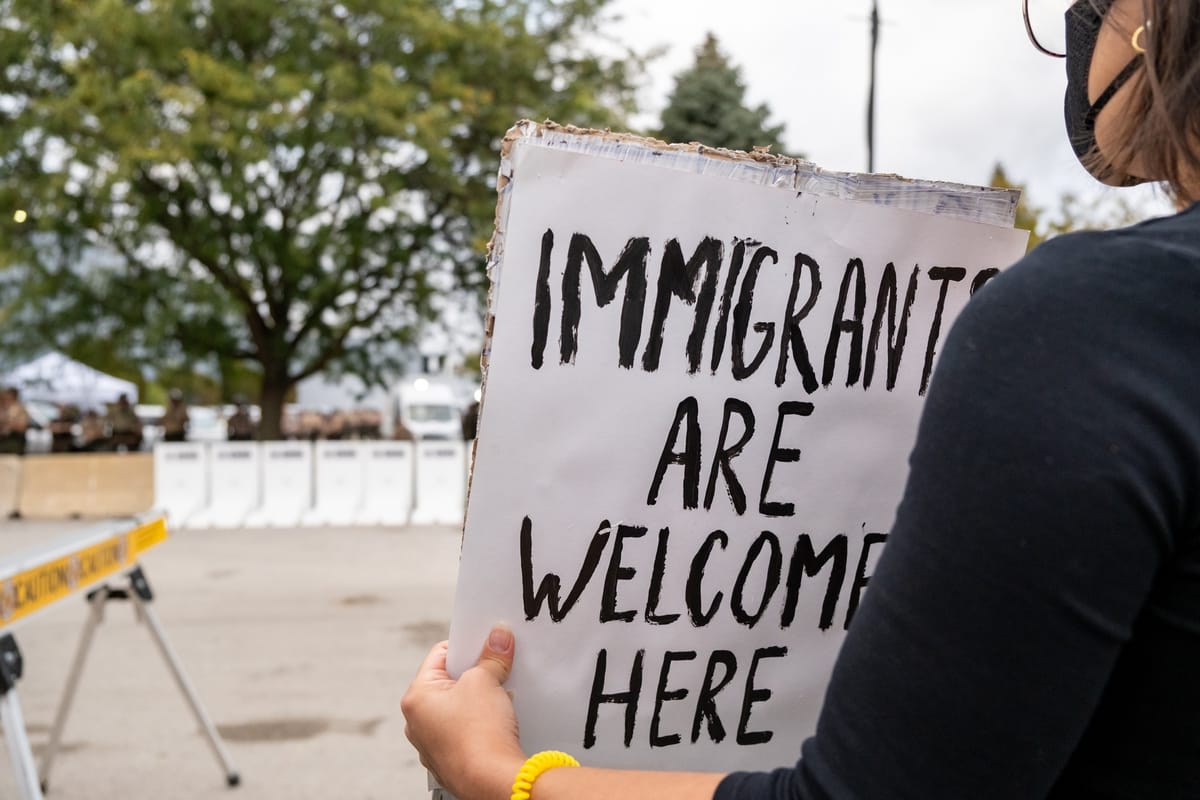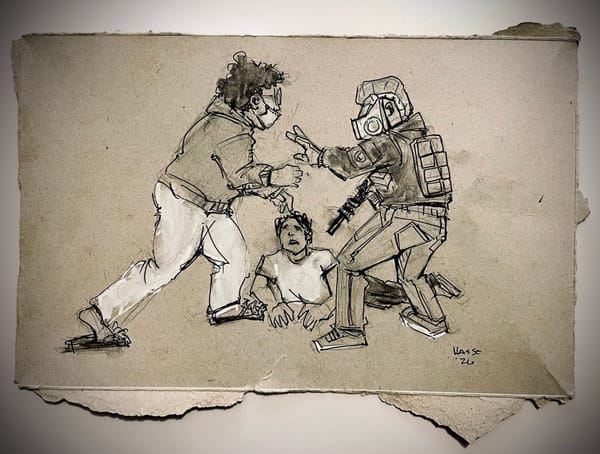What Now, Chicago? Regrouping After Midway Blitz
Let’s make this a winter of fortification, of learning, and bonding together like the winter snow that federal agents are so afraid of.


The daily battery of ICE alerts that many Chicagoans have come to expect has slowed in recent days, as Border Patrol boss Gregory Bovino has moved his fascist spectacle of snatch-and-grab violence to Charlotte, North Carolina. At least 81 people were seized by federal agents over the weekend in Charlotte, where community members are already protesting and organizing in defense of their neighbors. In Chicago, they called their fascist roadshow “Operation Midway Blitz.” In North Carolina, they’re calling it “Operation Charlotte’s Web”—perverting the title of a beloved children’s story about friendship and protecting the vulnerable.
My heart goes out to Charlotte as we grapple with the damage done in Chicago. The Department of Homeland Security claims that over 3,000 people have been arrested by ICE and Border Patrol agents throughout Chicagoland since early September. Last week, a federal judge ordered the immediate release of 13 detainees and placed approximately 615 others in line for review and potential release, after attorneys argued those arrests violated a consent decree.
As efforts to free our stolen neighbors continue, the relief many Chicagoans may feel, as the “blitz” dies down, is tempered by the knowledge that the forces that terrorized our city are now attacking people in Charlotte. We’re also living in a state of uncertainty about our own future. Shortly after Bovino and his masked band of brutes posed for a souvenir photo at “The Bean” in Millennium Park, a source in DHS told The Chicago Sun-Times that 1,000 agents would hit Chicago’s streets in March. That’s four times the number of agents that were reportedly deployed during Operation Midway Blitz.
So, as we process this news, and this transition, how should Chicago activists be handling themselves right now?
First, a lot of us need to take a breath. The past two months have been exhausting. From packing in too many meetings to missing work and time with loved ones while responding to ICE attacks, to getting stuck in go mode, unable to relax or believe that tomorrow might be a calmer day, our nerves are shot. Many of us need to feel something else. We need to be kind to ourselves and each other. We need to laugh, blow off steam, and sing together. We need to give thanks for the solidarity and communal bonds that allowed us to show up for each other and for our neighbors. We need to take care of ourselves and get some rest.
Then, we need to prepare, because Bovino and his goons will be back.
We don’t know if government threats about returning in March with four times as many agents are true, or whether that dangling threat is just another act of terror, intended to sow fear and panic in a city this administration hates. But at a practical level, we must take the threat at face value and prepare. Some groups are already doing that work: synthesizing what we’ve learned from Midway Blitz to inform political education efforts this winter. It’s clear that ICE agents can’t hack the cold here in Chicago, and we have to make that our strength. People who showed up in droves for community meetings, protests and ICE patrols over the past couple of months can’t go into social or political hibernation now. We need to sharpen our skills and our analysis and strengthen the relationships that have enabled us to act together. We need to keep talking to our neighbors and opening dialogues between groups, institutions and organizations that can work in concert and support each other.
While some patrol patterns and practices may ease up, the lines of communication that made them possible must be maintained—or replaced with better, more strategic and secure modes of communication. If a comms thread grew fast and loose, out of necessity, it may be time to regroup and do some vetting. This is a time to foster trusted teams.
If you have a trusted network, think about what you can do to preserve and deepen those connections this winter. Rather than letting people drift apart, as our collective tension eases, ask yourself what social events, and opportunities to learn, think and strategize together can help maintain group dynamics. How can we get to know each other better? How can we build more trust? How can we increase our preparedness?
During Midway Blitz, I was encouraged to see some groups organize healing events that helped people process trauma. We are going to need more of those, as people recover from the events of the past couple of months, and we are going to have to weave healing, and a sense of what it takes to help people maintain themselves, into our strategies moving forward. Midway Blitz was a campaign of terror. It was exhausting and traumatic by design. If we don’t attend to the feelings of hurt, shock, and emotional exhaustion this work brings up, we will lose waves of people to burnout—and that is how we will lose. To stay in this fight, and live in opposition to the cruelty and violence these fascists would impose upon us, our resistance must be grounded in a culture of care. We must encourage people to be tender with themselves, and we must learn to be tender with each other—even when we frustrate each other.
One source of frustration, for a number of activists, over the past couple of months has also been a source of strength for our efforts. The sheer number of people who turned out to participate in this resistance has meant that a large number of people in the streets were previously unpoliticized, or had little exposure to radical politics. That’s led to some awkward exchanges and conversations. People who have attended ICE watch trainings in Chicago have been told, in no uncertain terms, not to call police when they see ICE, because the cops will not help us or our neighbors, and also pose a threat to vulnerable and criminalized people. Not everyone who showed up in the heat of the moment had attended one of those trainings, and even some who had still questioned why police couldn’t be a source of help to us.
While ICE watch trainings in Chicago often involve some explanation that ICE watch evolved out of the cop watching traditions of the Black Panther Party, many people still don’t understand that ICE enforcement is policing. The kidnappings, brutality, torture and murders committed by Chicago police have fueled the most fervent activism in this city over the last decade, because the legacy of policing in this city, and in the United States, is terror. The fact that activists and advocates successfully fought for laws in the state of Illinois that forbid local law enforcement from assisting ICE with immigration enforcement—a rule that hasn’t always held up in the streets—does not mean, as some people have surmised, that “the police are on our side.” This misunderstanding of the role of police in this moment, and in our lives, is fueled by differing experiences of policing based on identity, proximity to wealth, and the differently policed geographies of Chicago. To strengthen our bonds, and our resistance, some people will have to lean into discomfort and understand what policing means to Black, brown, poor and disabled people in this city, and how stop and frisk and other common violations of our rights and humanity by police have helped set the stage for this moment.
During these dark times, we need solidarity with each other, not ill-informed allegiances to institutions that helped deliver us to this moment. That includes solidarity with people who are now facing charges for acts of conscience during Midway Blitz. We must show up for them in court and uplift demands that the charges against them be thrown out. Too often, defendants in cases stemming from moments of mass activation are abandoned by those who cheered the actions of resistors during the heat of a movement moment. We must not allow that to occur. No one should be facing charges for acting in opposition to ICE, whether they were protesting at Broadview, filming ICE, or holding onto their neighbors in the streets. Some of the charges community members are facing were brought locally, when protesters and resistors were arrested by Illinois state police or Chicago police officers—which means local officials who claim to oppose ICE should be pressured to demand that all of those charges be dropped. When the fascists come to round people up, there are only two sides. While political leaders offered rhetoric, social media posts, and legal maneuvers, Chicagoans put their bodies and lives on the line in defense of their neighbors and values. Those risks and sacrifices must be honored by any politician who claims to be on our side. You are not fighting fascism if you cage people who fight fascism.
As a resistance movement, we must be uncompromising in our support of one another. We must surrender nothing and no one.
We must also continue to be patient with one another. One week before Operation Midway Blitz began, when we knew a federal invasion of some shape was imminent, I organized a meeting where about 60 activists from across the city discussed community defense and resource mapping. At the start of that gathering, I mentioned that there were people from a lot of neighborhoods, groups, and political persuasions in the room, and that some of the people present probably didn’t like each other. Someone called out, “That’s right,” affirming their distaste for some group or person that was present. “That’s good,” I told them. “Because there aren’t enough people you like, or that you’re gonna find easy agreement with to wage this fight. We need everyone here, and a whole lot of others who we might never otherwise work with or talk to. Because that’s what it’s going to take.”
And that’s what it took—and what it will continue to take.
This is a painful time in our city. As we fight to free our detained neighbors, we know that some have already been deported. Families have been ripped apart, and the financial hardships of this crisis have been devastating. Despite our best efforts to support those impacted, there are people being evicted, and some businesses may not survive the loss of revenue that a climate of fear and terror has inflicted. As we grapple with our losses and do our best to support people whose lives have been upended, we should also take pride in the ways we’ve shown up. I have always believed in Chicago, but right now, my love for this city overwhelms me. They tried to make an example of us, to punish Chicago for its progressive politics, for its Blackness and brownness, and for welcoming people they would dispose of or destroy. But our city refused to bow down. We have defended our neighbors and each other. We have held the line and helped foster a culture of loving resistance in opposition to this monstrous administration. Whistles are being distributed in other cities, as those who are preparing for or already enduring similar onslaughts learn from our actions.
Of course, not everything we’ve done in Chicago will be transferable across time and space. As community members in other cities and states square off with federal agents, they will bring their own skills, tactics, and legacies of organizing to that work, and they will innovate, just as we have. We must learn from them, too, and offer them our support. Because while I am always fighting for Chicago, the us in this fight is much bigger than my neighborhood or the city I love. Everyone who opposes fascism, everyone who comes running when they hear a neighbor scream or a whistle blow, everyone who is willing to fight for decency and our collective liberation is in this together, however awkwardly. We need each other, and we need to help each other.
So, let’s make this a winter of fortification, of learning, and bonding together like the winter snow that federal agents are so afraid of. Let’s hold onto each other, and become even harder to move.
Organizing My Thoughts is a reader-supported newsletter. If you appreciate my work, please consider becoming a free or paid subscriber today. There are no paywalls for the essays, reports, interviews, and excerpts published here. However, I could not do this work without the support of readers like you, so if you are able to contribute financially, I would greatly appreciate your help.




